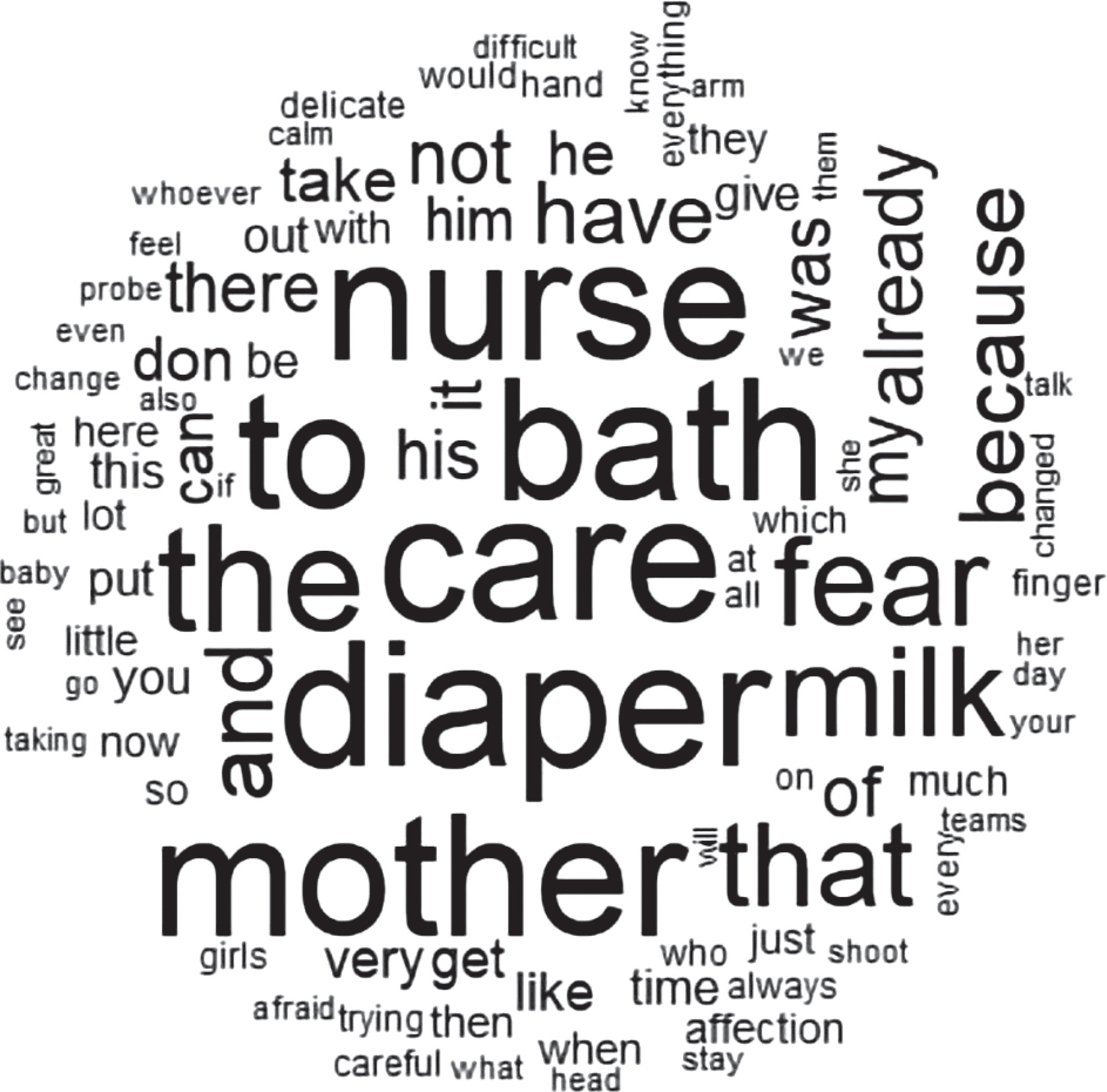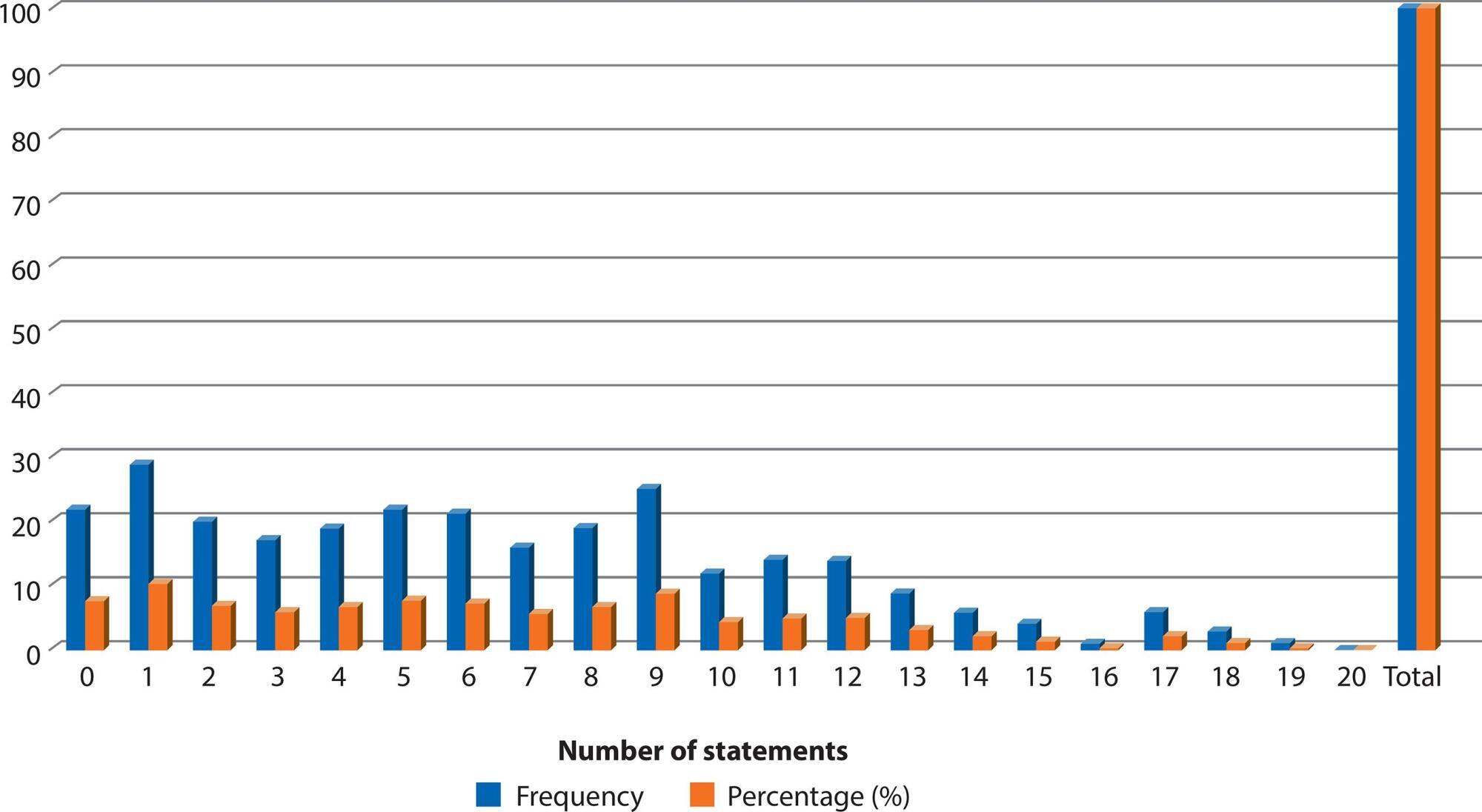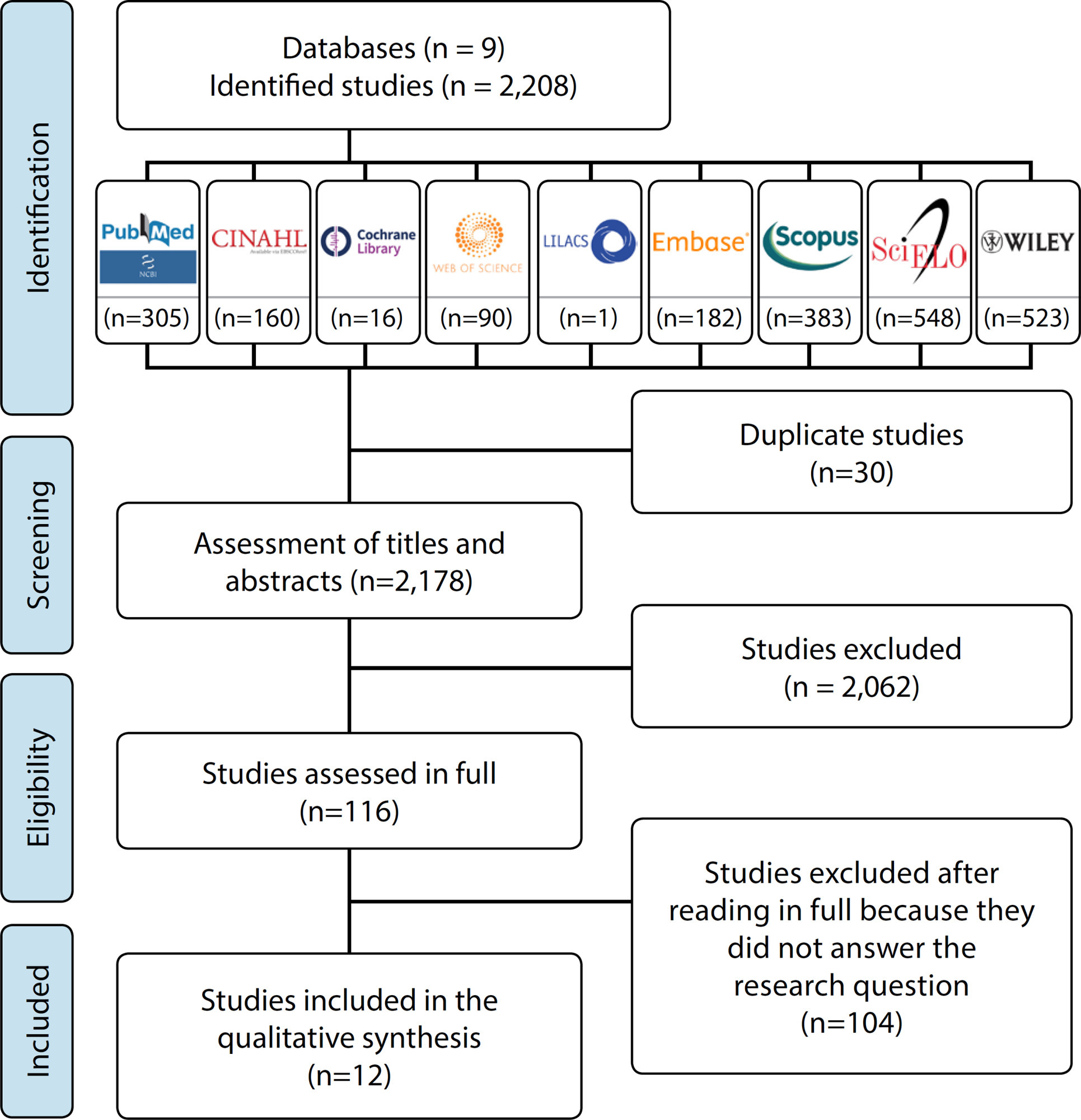-
ERRATUM01-15-2024
ERRATUM
Revista Brasileira de Enfermagem. 2024;77(1):e2024n1e01
Abstract
ERRATUMERRATUM
Revista Brasileira de Enfermagem. 2024;77(1):e2024n1e01
DOI 10.1590/0034-7167.20247701e01
Views3In the article “The ethics of nursing care for transgender people”, with DOI number: , published in Revista Brasileira de Enfermagem, 2023;76(Suppl 3):e20220797, in authorship: Where it read: […]See more -
01-15-2024
ERRATA
Revista Brasileira de Enfermagem. 2024;77(1):e2024n1e01
Abstract
ERRATA
Revista Brasileira de Enfermagem. 2024;77(1):e2024n1e01
DOI 10.1590/0034-7167.20247701e01
Views1En el artículo “La ética del cuidado de enfermería para personas transgénero”, con número DOI: , publicado en la Revista Brasileira de Enfermagem, 2023;76( Suppl 3):e20220797, en autoría:Onde se lia:[…]See more -
ORIGINAL ARTICLE01-13-2024
Knowledge, Attitudes, and Practices of nurses regarding blood culture collection
Revista Brasileira de Enfermagem. 2024;77(6):e20230424
Abstract
ORIGINAL ARTICLEKnowledge, Attitudes, and Practices of nurses regarding blood culture collection
Revista Brasileira de Enfermagem. 2024;77(6):e20230424
DOI 10.1590/0034-7167-2023-0424
Views2See moreABSTRACT
Objectives:
to investigate the knowledge, attitudes, and practices of nurses regarding blood culture collection.
Methods:
a cross-sectional study was conducted in five Brazilian public hospitals with 112 nurses. Data were collected using an adapted questionnaire and analyzed through descriptive and inferential statistics.
Results:
nurses who did not consider themselves capable of collecting blood cultures had a 72% lower chance of performing the collection at the recommended site and an 83% lower chance of using the same needle for blood inoculation into the vials. Nurses working in the emergency department had a 75% lower chance of knowing the international benchmark for blood culture contamination rates, and those with less than 5 years in the position decreased their chance of accuracy in this matter by 79%.
Conclusions:
there are gaps in the knowledge, attitudes, and practices of nurses regarding blood culture collection. Standardization of the technique, periodic education, supervision and guidance of the collection team, and process auditing are recommended coping strategies.

-
ERRATUM01-13-2024
ERRATUM
Revista Brasileira de Enfermagem. 2024;77(6):e2024n6e08
Abstract
ERRATUMERRATUM
Revista Brasileira de Enfermagem. 2024;77(6):e2024n6e08
DOI 10.1590/0034-7167.20247706e08
Views2In the article “Brazilian nursing specific situation, middle and micro-range theories: a bibliometric study”, with DOI number: , published in Revista Brasileira de Enfermagem, 2024;77(4):e20230520, Chart 1:Where it read:[…]See more -
ORIGINAL ARTICLE01-13-2024
Evaluation of care for people with HIV in Primary Health Care: construct validation
Revista Brasileira de Enfermagem. 2024;77(6):e20230190
Abstract
ORIGINAL ARTICLEEvaluation of care for people with HIV in Primary Health Care: construct validation
Revista Brasileira de Enfermagem. 2024;77(6):e20230190
DOI 10.1590/0034-7167-2023-0190
Views2See moreABSTRACT
Objectives:
to verify the construct validation of an instrument for evaluating care for people living with HIV in Primary Health Care.
Methods:
methodological study carried out in 2021 with 260 health professionals in Recife, PE. Validation based on the internal structure was carried out at this stage using exploratory and confirmatory factor analysis, and validity based on item response theory.
Results:
the validation determined the retention of five factors and 63 items. The instrument’s internal consistency and quality of fit was 0.90, the Tukey-Lewis index was 0.915 and the comparative fit index was 0.918 in the confirmatory factor analysis. The indication for the absolute majority of items is adequate fit.
Conclusions:
the instrument has construct validity, making it possible to use it to evaluate the decentralization process and care for People Living with HIV in Primary Health Care.

-
ERRATUM01-13-2024
ERRATA
Revista Brasileira de Enfermagem. 2024;77(6):e2024n6e07
Abstract
ERRATUMERRATA
Revista Brasileira de Enfermagem. 2024;77(6):e2024n6e07
DOI 10.1590/0034-7167.20247706e06pt
Views2No artigo “Crenças e atitudes de pais ou responsáveis legais sobre a vacinação infantil: revisão de escopo”, com número DOI: , publicado no periódico Revista Brasileira de Enfermagem, 2024;77(4):e20240126, página 5:Onde se lia:[…]See more -
ORIGINAL ARTICLE01-13-2024
Social representations of oncologic surgery for patients with cancer
Revista Brasileira de Enfermagem. 2024;77(6):e20230273
Abstract
ORIGINAL ARTICLESocial representations of oncologic surgery for patients with cancer
Revista Brasileira de Enfermagem. 2024;77(6):e20230273
DOI 10.1590/0034-7167-2023-0273
Views2See moreABSTRACT
Objectives:
to analyze the social representations of patients with cancer regarding oncologic surgery.
Methods:
a qualitative study based on Social Representation Theory was conducted with 126 participants between October 2021 and May 2022 in a public hospital in Rio de Janeiro. A characterization questionnaire, free evocations of the inducing term “surgery”, and semi-structured interviews with 60 participants were applied. Data were analyzed using Microsoft Excel® and IRaMuTeQ.
Results:
the central core of the representation is composed of fear, cure, hope, and removing the disease. The analysis of interviews resulted in six classes that highlight the social changes caused by treatment as well as the need for a support network to cope with the surgical process.
Final Considerations:
the representations reflect fear and hope towards the procedure and the desire to remove the disease, thus translating the cure through surgery.

-
ORIGINAL ARTICLE01-13-2024
Nurses’ perspectives on the use of telemonitoring in the management of people with diabetes and hypertension
Revista Brasileira de Enfermagem. 2024;77(6):e20230481
Abstract
ORIGINAL ARTICLENurses’ perspectives on the use of telemonitoring in the management of people with diabetes and hypertension
Revista Brasileira de Enfermagem. 2024;77(6):e20230481
DOI 10.1590/0034-7167-2023-0481
Views3See moreABSTRACT
Objectives:
to understand the perspective of nurses on the use of telemonitoring in the management of people with type 2 diabetes mellitus and arterial hypertension in primary care.
Methods:
this qualitative research involved sixteen nurses from eight municipalities in Paraná. Data were collected between November 2022 and January 2023 through inperson or remote interviews, which were audio-recorded and subjected to content analysis.
Results:
according to the nurses, telemonitoring enhances users’ knowledge about these conditions, communication and connection with the team, and productivity. However, the lack of electronic resources and equipment, high staff turnover, low user adherence, and the limited availability of professional time present significant challenges.
Final Considerations:
the effective implementation and operation of telemonitoring in the management of people with diabetes and hypertension involve both potential benefits and barriers. It is essential to have the availability of human and technological resources, managerial support, and the commitment of professionals and users.
-
ORIGINAL ARTICLE09-21-2020
The care provided by the family to the premature newborn: analysis under Leininger’s Transcultural Theory
Revista Brasileira de Enfermagem. 2020;73:e20190644
Abstract
ORIGINAL ARTICLEThe care provided by the family to the premature newborn: analysis under Leininger’s Transcultural Theory
Revista Brasileira de Enfermagem. 2020;73:e20190644
DOI 10.1590/0034-7167-2019-0644
Views0See moreABSTRACT
Objective:
To analyze the care practices of family members of premature infants admitted to a Neonatal Intensive Care Unit in the light of Leininger’s transcultural theory.
Methods:
Qualitative, descriptive and exploratory study. Participant observation and semi-structured interviews were conducted with 16 family members of newborns, admitted to the neonatal unit of a public maternity hospital, during the months of May and June 2019. The software called Interface de R pour analyses Multidimensionnelles de Textes et de Questionnaire® and the Bardin Content Analysis technique.
Results:
Two thematic categories emerged: Family care in the neonatal unit; (in)effective support for shared care.
Conclusion:
The participation of families in the care of babies is still unstable, but it must be an inseparable element of culturally congruent care, thus collaborating with the full recovery of the premature.

-
ORIGINAL ARTICLE02-10-2020
Common mental disorders in nursing technicians of a university hospital
Revista Brasileira de Enfermagem. 2020;73(1):e20180513
Abstract
ORIGINAL ARTICLECommon mental disorders in nursing technicians of a university hospital
Revista Brasileira de Enfermagem. 2020;73(1):e20180513
DOI 10.1590/0034-7167-2018-0513
Views0See moreABSTRACT
Objective:
To verify the prevalence of common mental disorders and associated factors in nursing technicians.
Method:
Cross-sectional analytical study conducted at a university hospital. A questionnaire with sociodemographic, educational and work-related variables and the Self Reporting Questionnaire-20 were used to verify the presence of common mental disorders. Association analysis was performed using the chi-squared test, with a significance level of 5%.
Results:
280 nursing technicians participated in the study. The prevalence of common mental disorders was 46.9%. The variables family income (p=0.021) and working exclusively in health area (p<0.001) were associated with the outcome. There was a higher prevalence of CMD among individuals with a family income below four minimum wages (PR=1.41) and among professionals who worked exclusively in the health area (PR=1.95).
Conclusion:
Approximately half of the nursing technicians of the university hospital presented common mental disorders, which were associated with economic and work-related variables.

-
REFLECTION10-19-2020
Contributions of Florence Nightingale as a social entrepreneur: from modern to contemporary nursing
Revista Brasileira de Enfermagem. 2020;73:e20200064
Abstract
REFLECTIONContributions of Florence Nightingale as a social entrepreneur: from modern to contemporary nursing
Revista Brasileira de Enfermagem. 2020;73:e20200064
DOI 10.1590/0034-7167-2020-0064
Views0See moreABSTRACT
Objective:
To reflect on the transformations of modern and contemporary nursing as well as on Florence Nightingale’s social entrepreneurship.
Method:
This is a logical-reflective exhibition, with an emphasis on the theoretical assumptions of social entrepreneurship and the legacy of Florence Nightingale, from modern to contemporary nursing, based on readings of texts extracted from electronic databases, especially periodicals, books and theses.
Results:
The logical-reflective exhibition focuses on two fundamental aspects: 1) Florence Nightingale’s legacy as a social entrepreneur; 2) The evolution of Brazilian nursing: from modernity to contemporaneity.
Final considerations:
Florence Nightingale’s legacy is undeniable with regard to the evolution of modern and contemporary nursing and transcends different areas of knowledge. In addition to being a precursor to modern nursing, it is distinguished by its visionary attitude, humanitarian social value and potential for transforming the paths and realities present in the Contemporary Era.
-
ORIGINAL ARTICLE06-27-2019
Assessment of feedback for the teaching of nursing practice
Revista Brasileira de Enfermagem. 2019;72(3):663-670
Abstract
ORIGINAL ARTICLEAssessment of feedback for the teaching of nursing practice
Revista Brasileira de Enfermagem. 2019;72(3):663-670
DOI 10.1590/0034-7167-2018-0539
Views0See moreABSTRACT
Objective:
to analyze the self-reported knowledge of professors in the use of feedback in the teaching of nursing practice; train professors to use this process; and evaluate the results of this training.
Method:
a qualitative study of research-action type. The focus group technique was used with seven collaborators of a nursing technical school. For content analysis, the Bardin framework was used and, for intervention, the Problematization Methodology supported by Pendleton’s Rules.
Results:
most present in their curricula training to teach. It is pointed out that feedback is a simple and essential assessment tool, although universal discourse does not express the exact dimension of feedback potentialities. The intervention was effective to solidify feedback.
Final Consideration:
this study shows that feedback should be disseminated and consolidated among the teaching staff of nursing technical education.
-
ORIGINAL ARTICLE05-03-2021
Nursing care for patient in postoperatory heart surgery in the Intensive Care Unit
Revista Brasileira de Enfermagem. 2021;74(2):e20200163
Abstract
ORIGINAL ARTICLENursing care for patient in postoperatory heart surgery in the Intensive Care Unit
Revista Brasileira de Enfermagem. 2021;74(2):e20200163
DOI 10.1590/0034-7167-2020-0163
Views0See moreABSTRACT
Objective:
To investigate the critical nodes related to nursing care for patients in the postoperative period of cardiac surgery.
Methods:
Exploratory study with a qualitative approach. Data collected through semi-structured interviews with 27 members of the nursing team working in the Intensive Care Unit. Material submitted to thematic analysis.
Results:
Three categories emerged: Flaws in the professional qualification for patient care in the postoperative period of cardiac surgery; Team challenges concerning specific patient care in the postoperative period of cardiac surgery; and (dis) organization of work in the Intensive Care Unit and its impact on nursing care for patients in the postoperative period of cardiac surgery.
Final considerations:
Given the identification of the critical nodes, the professionals presented suggestions to overcome daily difficulties: investments in strategies for Permanent Education in Health; creation of tools to guide patient assistance in the postoperative of cardiac surgery; and provision of adequate human resources.
-
ORIGINAL ARTICLE12-13-2019
Factors associated with low Apgar in newborns in birth center
Revista Brasileira de Enfermagem. 2019;72:297-304
Abstract
ORIGINAL ARTICLEFactors associated with low Apgar in newborns in birth center
Revista Brasileira de Enfermagem. 2019;72:297-304
DOI 10.1590/0034-7167-2018-0924
Views1See moreABSTRACT
Objective:
to analyze factors associated with Apgar of 5 minutes less than 7 of newborns of women selected for care at the Center for Normal Birth (ANC).
Method:
a descriptive cross-sectional study with data from 9,135 newborns collected between July 2001 and December 2012. The analysis used absolute and relative frequency frequencies and bivariate analysis using Pearson’s chi-square test or the exact Fisher.
Results:
fifty-three newborns (0.6%) had Apgar less than 7 in the 5th minute. The multivariate analysis found a positive association between low Apgar and gestational age less than 37 weeks, gestational pathologies and intercurrences in labor. The presence of the companion was a protective factor.
Conclusion:
the Normal Birth Center is a viable option for newborns of low risk women as long as the protocol for screening low-risk women is followed.
-
REVIEW09-06-2022
Biosafety measures to prevent COVID-19 in healthcare professionals: an integrative review
Revista Brasileira de Enfermagem. 2022;75(1):e20201191
Abstract
REVIEWBiosafety measures to prevent COVID-19 in healthcare professionals: an integrative review
Revista Brasileira de Enfermagem. 2022;75(1):e20201191
DOI 10.1590/0034-7167-2020-1191
Views0See moreABSTRACT
Objective:
to identify the main biosafety measures for preventing COVID-19 in healthcare professionals.
Methods:
this is an integrative literature review, with studies published between January and July 2020, on the MEDLINE/PubMed, Scopus, Embase, Web of Science, LILACS, SciELo, Wiley Online Library, Cochrane CINAHL databases. The selection of studies followed the PRISMA recommendations.
Results:
among the 2,208 publications identified, 12 studies comprised the sample, which enabled the analysis in four thematic categories: The importance of using recommendations about the use of personal protective equipment; The restructuring of new operational and clinical routines and flows in the practice of services; Monitoring professionals, especially testing; Conducting training.
Conclusions:
the phenomena involved are innumerable, covering operational management and the training of teams to deal with highly infectious pathogens and disease outbreaks.

-
ORIGINAL ARTICLE09-21-2020
Adolescents in situations of poverty: resilience and vulnerabilities to sexually transmitted infections
Revista Brasileira de Enfermagem. 2020;73:e20190242
Abstract
ORIGINAL ARTICLEAdolescents in situations of poverty: resilience and vulnerabilities to sexually transmitted infections
Revista Brasileira de Enfermagem. 2020;73:e20190242
DOI 10.1590/0034-7167-2019-0242
Views0See moreABSTRACT
Objective:
To analyze the association between vulnerabilities to Sexually Transmitted Infections (STIs/HIV/AIDS) of adolescents in poverty and their level of resilience.
Method:
Cross-sectional study with 287 students between 11 and 17 years old in a school in the outskirts of Fortaleza-Ce. The study was conducted from August to October 2016. Three instruments related to characterization, vulnerability to STIs/HIV/AIDS and resilience were used. The association between the instruments was calculated using the Mann-Whitney and Kruskal-Wallis tests. Association between vulnerability to STIs/HIV/AIDS and resilience was assessed through the Spearman’s correlation coefficient. Statistical significance was set at p<0.05.
Results:
There was a significant association between the factors “housing” (p=0.022), “family income” (p=0.037) and vulnerability to STIs/HIV/AIDS. Adolescents whose father has completed high school (p=0.043) have moderately high resilience.
Conclusion:
Adolescents with low socioeconomic status and who live on less than a minimum wage tends to be more susceptible to vulnerabilities to STIs/HIV/AIDS and to have low resilience.
Search
Search in:
Nuvem de Tags
Adolescente (85) Atenção Primária à Saúde (239) COVID-19 (91) Criança (91) Cuidados de Enfermagem (269) Educação em Enfermagem (151) Educação em Saúde (139) Enfermagem (930) Enfermagem Pediátrica (86) Estudantes de Enfermagem (77) Estudos de Validação (131) Família (87) Idoso (208) Promoção da Saúde (99) Qualidade de Vida (104) Saúde do Trabalhador (86) Saúde Mental (145) Saúde Pública (82) Segurança do Paciente (150) Tecnologia Educacional (100)



